The Untold Story of the Marijuana Trade
Surfers Turned Smugglers in Thailand and Santa Barbara
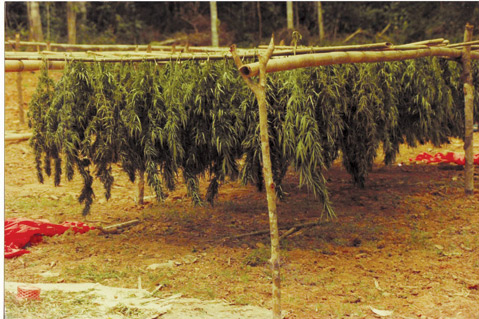
It’s a beautiful night in Santa Barbara sometime in the 1970s, and a group of men meet up at San Marcos Lanes. They bowl, drink beer, and finally, when everyone has arrived, get into their cars, pickup trucks, and VW campers and caravan to Summerland, where a blacked-out ship awaits a few hundred yards offshore. The vessel carries 15,000 pounds of Thai stick, the most potent (and the most expensive) marijuana in the world; it has arrived in California after a long journey across the Pacific from the Gulf of Thailand, where another enterprising group of young Americans loaded the shipment several weeks before. As a crew of experienced fishermen ferry the weed to the beach in Zodiacs — inflatable boats then favored by both Navy SEALs and outlaw off-loaders — the San Marcos bowlers pick up their shares of the cargo and vanish into the night. Within hours, the ship is gone, and so is the weed, dispersed in 20 or more vehicles and headed for thousands of customers who will happily pay a premium for the best pot that money can buy.
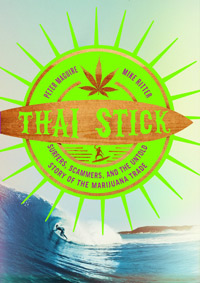
For their book, Thai Stick: Surfers, Scammers, and the Untold Story of the Marijuana Trade (Columbia University Press), authors Peter Maguire and Mike Ritter did assiduous archival research and thousands of hours of oral-history interviews. The result is a wide-ranging, compulsively readable account of how Thai stick, once an unremarkable staple of peasant life in rural Southeast Asia, became an international sensation; how it invaded and fundamentally altered American culture; and how daring young men — many of them Southern California surfers and watermen — brought the weed in increasingly large shipments to the West Coast, where it was offloaded on beaches from Mexico to Canada. Maguire and Ritter have given voice to an entire generation of people — including several Santa Barbarans — who have stayed hidden for fear of prosecution. Now that their stories are being told, these former prisoners of the “cannabis closet” are coming together to acknowledge their shared experience of living outside the law — or inside actual prisons — for decades.

Although the publication of Thai Stick happens to coincide with several unprecedented changes in the legal status of marijuana in America, this is not a tale of patients and their caregivers, nor is it the record of an emerging alternative source of state tax revenue. Instead, Thai Stick tells many stories, some sensational and even heroic, others just stupid and sad, of what it was like when pot was still totally illegal and how the original generation of surfer-scammers who began importing the drug from Southeast Asia gradually ran afoul not only of the law but also of their own and their collaborators’ personal limitations.
The following excerpts from Thai Stick center on Santa Barbara, where a few of the book’s colorful characters resided. The passages highlight the tensions and conflicts that led to the eventual downfall and dissolution of the surfer-scammer network under DEA pressure in the 1980s. It’s one of the great crime stories of the late 20th century, a Goodfellas for the Pacific Rim.
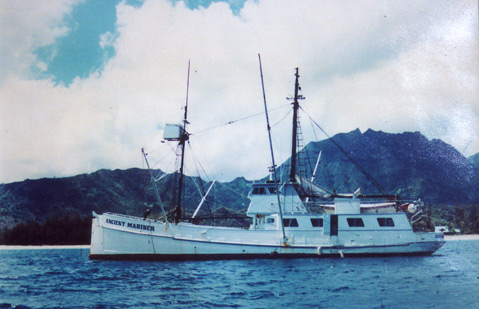
Excerpts (from p. 152)
After eighteen months in a Vietnamese jail, [Jim] Lawton had returned to Santa Barbara and resumed his work as a commercial fisherman. Some of his friends were offloading for the Coronado Company, and when he expressed interest, they invited him to a barbeque at Lou Villar’s Montecito mansion. The Corco leaders used to hold these informal cookouts to audition prospective employees. Lawton watched Corco bosses drink expensive French wine, smoke Thai sticks, and snort cocaine. “Coke! They had coke all the time. They had college girls. Tassels on their penny loafers! It was kind of gross at times to the beach crew guys. They were living in big mansions on Park Lane,” said Lawton. “The whole thing with polo ponies — not one, not two, a stable full! A couple Cobras, matching ones, a red one on a trailer — just this type of extravagant stuff.”
The fisherman was especially unimpressed by Lou Villar. To him, Villar was a caricature of a drug dealer. “They called him ‘Poppers.’ He was supposed to be like the Godfather, Poppers, the dad, the big daddy,” recalled Lawton. “They’d all just go goo-goo over all their fame and fortune and stuff.” What was missing to the surfer-smuggler was “that hippie vibe that we’d had when we were working independently, just doing a handful of things and doing our own core loads, Ma and Pa operations.”
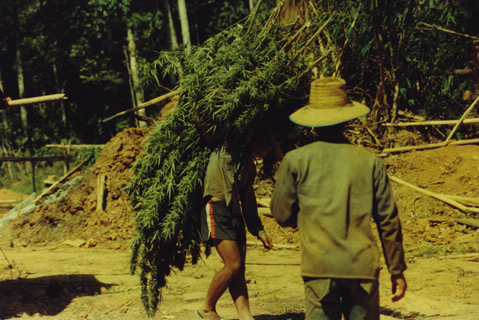
Despite his misgivings about the Coronado men, Lawton took charge of the offload.
Lawton and his fisherman friends launched their inflatables from Bear Harbor [in Mendocino County], ran out to a big black trawler, and stacked pot bales on the Zodiacs. “I’d have to stand on the edge of the boat and look over a giant pile to navigate it back into shore. Then there were rocks in this cove where we had to navigate in — it was kind of a channel, the place where you wanted to go between the wash rocks.” The smugglers followed their underwater light sticks channel back to the beach, where body-lifted four-wheel-drive trucks with camper shells were waiting. Once the boats landed, the beach crew set up supermarket roller ramps that went from the boats to the trucks’ tailgates.

Even though there was a public access road into Bear Harbor, the trucks went up a steep firebreak trail to the ridgeline. “They just had these four-wheel-drive trucks with little shell campers and big V-8 engines and big knobby tires, and they’d roar these loads up and get them out of town before dawn.” Corco posted one man dressed in a forest service uniform, complete with Smokey the Bear hat, nametag, flashlight, and law enforcement belt and key ring. His vehicle looked identical to a U.S. Forest Service truck, and was posted on the main road. The “ranger” knocked down a tree with a chainsaw, so even if someone got past him, there was still the tree to get over. The few times he encountered campers, the fake ranger told them there was a rabid skunk on the beach or that the police were searching the area for a dangerous fugitive. After the eight tons were successfully offloaded and sold, [Ed] Bridgely [co-founder of the Corco] flew back to Japan with a leather suitcase that held $250,000 cash under the false bottom [for the crime syndicate Yakuza, which helped rescue a Corco boat at one point and were owed a quarter of a million — Ed.]. “They got a quarter large and they were laughing. Everything worked out. We had no problems.”
In just a few short months, Ed Bridgely of the Coronado Company would find out just how wrong he was, and the setting was once again Montecito.
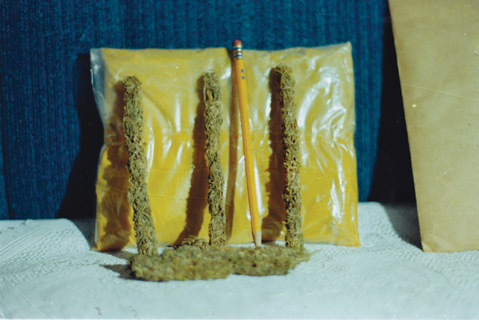
(from p. 157)
Thanks in part to the information provided by Lou Villar’s unpaid carpenter, the DEA had the Corco’s leaders’ houses under surveillance and their phones bugged. Agents were waiting when Ed Bridgely and two other Corco principals pulled up to a horse ranch in Montecito. Just as Bridgely was about to turn his Mercedes into the driveway, he saw a guy in a Chevy Vega drop his newspaper and pick up a radio. The smuggler floored the powerful sedan, but as he came around the corner, a pickup truck blocked the road. Before he could turn around, an undercover policeman pulled alongside and he was staring down the barrel of a pistol. Three more agents arrived on the scene and handcuffed the Corco leaders. “Your name is Ed Bridgely,” said one of the cops. “No, no you have the wrong guy,” he replied, as he handed him a California driver license in the name of James Norris. The officer called the license in and someone on the other end of the radio spat: “I don’t care what that guy’s name is, who he says he is, you bring him down here NOW!” Inside the briefcase, they found two more California driver licenses with the same photo and a binder filled with notes about Corco’s smuggling activities.
Bridgely’s bail was set at $5,000,000, and multiple indictments were issued after the initial arrests. Cooperating witnesses named everybody from the truck drivers to the offloaders, even the guy in the fake forest service outfit. Offloader Jim Lawton was one of the men caught in Agent Jim Conklin’s dragnet. “They were like slap-on-the-back-yes-men, and everything’s groovy and we’re so cool, tennis courts and bottles of wine and sweaters wrapped around their necks,” said offloader Jim Lawton. “They did not even bother to pay lip service to the old ideals of trust or loyalty; those guys didn’t have that.”
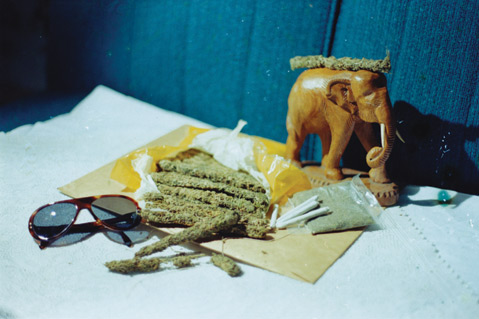
In an attempt to distance himself from the Coronado Company, Lawton and his friends dubbed themselves “the Santa Barbara Five.” When the fisherman saw Agent Conklin [the DEA’s point man in the Corco prosecution] at Joe’s Restaurant on State Street in Santa Barbara, he smiled at him. “It was just like friendly cops and robbers. He knew that the Santa Barbara Five, the beach crew guys, were all surfers and fishermen. He knew he wasn’t chasing somebody who was going to shoot him. It wasn’t a restaurant in Chicago where he was sitting at this table and we were sitting at the next one by chance and there was going to be a shootout. He knew we didn’t have anything more than a smile.” Lawton saved his harshest words for the Corco leaders. “They turned us in, that was really the lowest thing,” he said. “And they rubbed it in our faces and got us into it, then they had the nerve not to pay us fully.”
All of the smugglers and their lawyers were dragged into court in San Diego. Lawton pled guilty to federal conspiracy charges and refused to talk: “It was the simple, clean way out, going through the whole thing. So bingo, I just said, ‘Okay, I can do that. I don’t need to talk about anybody. I’m not going to tell you anything. I’ll tell you what I did.’” The offloader was sentenced to a year in Lompoc Federal Prison; compared to Vietnamese jail, it was easy. Not only was he allowed letters and visitors, by the time he got there, everyone had heard about his case. “I smoked just as much weed at Lompoc or at MCC [Metropolitan Correction Center, San Diego] as I would on the street,” he said. “We were treated as celebrities whenever we went anywhere, because everybody knew the story of the Coronado Company in jail — that we’d done these huge loads of Thai weed and like that, and that we were heroes and the guys had snitched us off.”
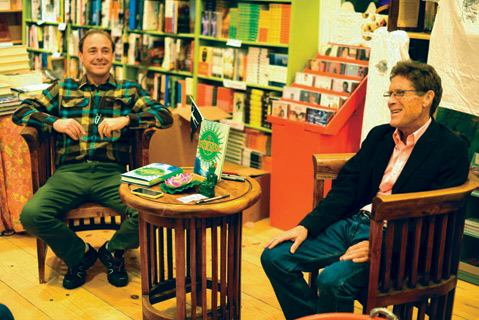
What Happened? An Interview with Mike Ritter
Last fall, Thai Stick authors Peter Maguire and Mike Ritter held a book-signing at Chaucer’s Books. The crowd in attendance included quite a few men in their fifties and sixties, many of them wearing baseball caps and sporting Hawaiian-style shirts. The scammers were in the house. A large tub of Tecate on ice completed the picture, at the center of which sat Ritter, a tanned, fit 65-year-old with a bright but cautious smile. Surfer-turned-scammer, a brilliant navigator with a mathematical bent, Ritter freely admits to having spent a big part of his adult life smuggling marijuana in some form or another — beginning as a 19-year-old on the Hippie Trail through Morocco to Afghanistan and then Southeast Asia. Ritter grew up in Santa Barbara, and clearly most of the people who were there had turned out to see him, to ask him questions, and to talk about the book.
How did it feel that night at Chaucer’s? Euphoric. It was great to be back in Santa Barbara, especially on the book trip. I wanted to stay. Seeing people I knew in high school, people who were very dear to me, was powerful. And just the place itself is powerful. When I smell the sage and the damp of the morning fog hits me, it’s like a punch in the face.
How has it been to look at your life through the lens of historical research? What this project has done for me is give me some kind of answer to a question that I have wondered about for most of my life, which is “What happened?” How did a whole generation get to be so crazy? As a kid, I was a motivated student in science with the talent and support to do whatever I wanted. Sure, there was a certain wanderlust in my character, but does that explain it? Conducting these interviews and doing the research for the book has finally allowed me to get a handle on it that works for me. I didn’t set out to become an outlaw. Now I wish I had done more on the inside of society and the law with my life, perhaps become some kind of scientist. But my generation went out in the world to teach ourselves — that was our approach. There were so many obvious flaws in what we were told and in what we were taught that we felt we had to start again from the beginning to develop our own understanding.
And this insight, which came from the historical research process, led me to a deeper question than the one I had been asking for so long about myself, because it made me begin to wonder again about the intense reaction that we encountered — the war on drugs. I started to ask why there was this phobia about marijuana, what made it such a target? And I saw that even the moral crusaders who drove the thing were not themselves able to articulate their fear. America is a terribly competitive place, and the enduring presence of a strong military in the culture, the emphasis on status both within and outside its borders, was threatened by this thing that could make people not care so much about that kind of status, and about their place in the competition. A thing that makes people not care cuts them to the core.
Do you feel vindicated by the changes to the law that are happening state by state today? Not really. It’s complicated, but I’m not entirely satisfied with what’s happening now. When we started out doing this in the late 1960s, I think we all believed that prohibition would come to an end, and that marijuana would be legal by the time we turned 30. If you had asked the scammers back then, 99 percent of them would have said yes, it will be legal any time now. And that’s what I thought, too, but then Reagan came in, and prosecutors began using RICO more, and my feelings shifted all the way the other way, and I assumed that nothing would ever change.
Now when I go to California and see what’s happening, I’m stunned. Whatever blend of activism and demographics that’s led to this, I give credit to the strategists. But medical marijuana? Paying taxes on marijuana? It all kind of annoys me. I don’t think people should have to pretend to be sick because they want to smoke pot. Part of me is dissatisfied with the new thing because at heart, I’m a smuggler, and I’ll do what I want no matter what you say. I have civil liberties, and you are at fault if you abridge them. I see a situation that’s changing rapidly, and looking back on what came before, and knowing that there are guys doing life sentences for being successful at this business, I feel like the people who made it illegal should be held accountable.



